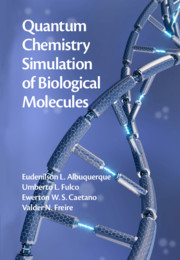Book contents
- Frontmatter
- Contents
- Preface
- Figure Credits
- 1 Basic Properties of Quantum Chemistry
- 2 Charge Transport in the DNA Molecule
- 3 Electronic Transmission Spectra of the DNA Molecule
- 4 Thermodynamic Properties of the DNA Molecule
- 5 Properties of the DNA/RNA Nucleobases
- 6 Molecular Electronics
- 7 Amino Acid Anhydrous Crystals
- 8 Protein–Protein Systems
- 9 Ascorbic Acid and Ibuprofen Drugs
- 10 Cholesterol-Lowering Drugs
- 11 Collagen-Based Biomaterials
- 12 Antimigraine Drugs
- 13 Antiparkinson Drugs
- 14 Central Nervous System Disorders
- 15 The Biology of Cancer
- 16 Concluding Remarks
- Bibliography
- Index
11 - Collagen-Based Biomaterials
Published online by Cambridge University Press: 21 January 2021
- Frontmatter
- Contents
- Preface
- Figure Credits
- 1 Basic Properties of Quantum Chemistry
- 2 Charge Transport in the DNA Molecule
- 3 Electronic Transmission Spectra of the DNA Molecule
- 4 Thermodynamic Properties of the DNA Molecule
- 5 Properties of the DNA/RNA Nucleobases
- 6 Molecular Electronics
- 7 Amino Acid Anhydrous Crystals
- 8 Protein–Protein Systems
- 9 Ascorbic Acid and Ibuprofen Drugs
- 10 Cholesterol-Lowering Drugs
- 11 Collagen-Based Biomaterials
- 12 Antimigraine Drugs
- 13 Antiparkinson Drugs
- 14 Central Nervous System Disorders
- 15 The Biology of Cancer
- 16 Concluding Remarks
- Bibliography
- Index
Summary
Collagen-based biomaterials are expected to become a useful matrix substance for various biomedical applications in the future. By taking advantage of the crystallographic data of the triple-helical peptide T3-785, a collagen-like peptide whose homotrimeric structure presents large conformational similarity to the human type III collagen, we present a quantum chemistry study to unveil its detailed binding energy features and conformation stability, considering the inter-chain interaction energies of 90 amino acid residues distributed into three interlaced monomers. Our theoretical model is based on the density functional theory formalism within the molecular fragmentation with conjugate caps approach. We present also its interaction with the integrin, a collagen receptor that facilitates cell-extracellular matrix adhesion, looking for the development and synthesis of artificial collagen with high stability for bioengineering applications. Besides, we depicted the relevance of each strand in the triple-helical collagen structure, helping the understanding of the events involving the integrin–collagen complex interaction energy.
Keywords
- Type
- Chapter
- Information
- Quantum Chemistry Simulation of Biological Molecules , pp. 249 - 282Publisher: Cambridge University PressPrint publication year: 2021



